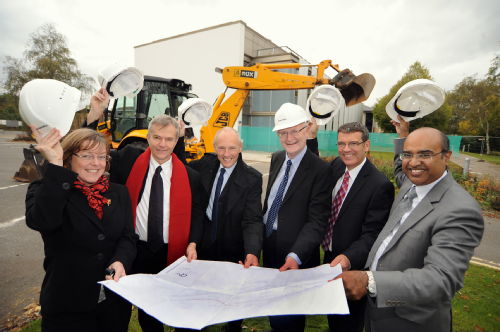New building to help University of Warwick scientists uncover the building blocks of cells
 Construction work has begun on a new building which will house scientists working on the building blocks of living cells at the University of Warwick.
Construction work has begun on a new building which will house scientists working on the building blocks of living cells at the University of Warwick.
The Centre for Mechanochemical Cell Biology, based at Warwick Medical School, will focus on the basic science of cells and molecular systems and then apply the new knowledge to help develop new treatments to benefit patients.
The new facilities, being built as Warwick Medical School celebrates its tenth anniversary, have been funded by the University of Warwick (£3.4m), The Wolfson Foundation (£1m) and Advantage West Midlands, via the Science City Research Alliance’s Translational Medicine Project (£1.9m).
The Science City Research Alliance Translational Medicine project is part of a larger investment by Advantage West Midlands and ERDF in the research infrastructure of the West Midlands region, which unites the University of Birmingham and the University of Warwick in a strategic research partnership within the Birmingham Science City initiative. Other projects funded through this source include the Clinical Trials Unit at the Warwick Medical School (WMS) and the Human Tissue Biorepository at the University of Birmingham’s College of Medical and Dental Sciences.
Mechanochemical cell biology seeks to understand the principles and mechanisms by which cells organize their contents in space and time. It is an emerging area of interdisciplinary research that has enormous potential for advancing our understanding of essential cell processes and applying this knowledge for the benefit of patients.
The new building will initially be home to four research teams, led by Director of the Centre Professor Rob Cross, Dr Andrew McAinsh, Dr Anne Straube and Dr Nick Carter. These teams were formerly part of the Marie Curie Research Institute.
Vice-Chancellor of the University of Warwick, Professor Nigel Thrift said: “We are delighted to be commencing building works in this, the 10th anniversary year of WMS. The Medical School has gone from strength to strength over the last decade and this new facility is a testament to the hard work of our staff to continue to strive to push the boundaries of clinical research.”
Director of the new Centre for Mechanochemical Cell Biology, Professor Rob Cross said: “Over the last year, Warwick has encouraged CMCB scientists to work closely with the building design team - what has emerged is a unique, state-of-the art customized environment for research into the machinery of living cells – defects in which are important in cancer and in reproductive, neurological and cardiovascular disease. The new building will have a tremendous impact on our science, and is an important symbol of the commitment of WMS to world class biomedical research.”
Vice-chairman of Birmingham Science City, Gren Messham said: “We are delighted that Birmingham Science City is able to support the Centre for Mechanochemical Cell Biology, through funding from Advantage West Midlands. Together with the expertise of the Science City Research Alliance, this building will form a key component of research into translational medicine in the West Midlands region, which is playing such an important part in treating the problems of tomorrow today.”
Notes to editors
Pictures are available here:
Caption: From left to right, Director of the Science City Research Alliance Professor Pam Thomas, Director of the Centre for Mechanochemical Cell Biology Professor Rob Cross, Birmingham Science City Vice-Chairman Gren Messham, University of Warwick Vice-Chancellor Professor Nigel Thrift, Professor John Davey from Warwick Medical School and Professor Sudhesh Kumar, Pro-Dean Research at Warwick Medical School.
For more information contact Kelly Parkes-Harrison, Communications Manager, University of Warwick, 02476 150483, 07824 540863, k.e.parkes@warwick.ac.uk
Birmingham Science City is a region-wide partnership of public sector, businesses and the research base, which is facilitating the use of science and technology to improve the quality of life and prosperity of the West Midlands. Funded by Advantage West Midlands, Birmingham Science City’s aim is to create strategies to exploit centres of world-class scientific research, by developing relevant activities for sustainable economic and social benefit.
